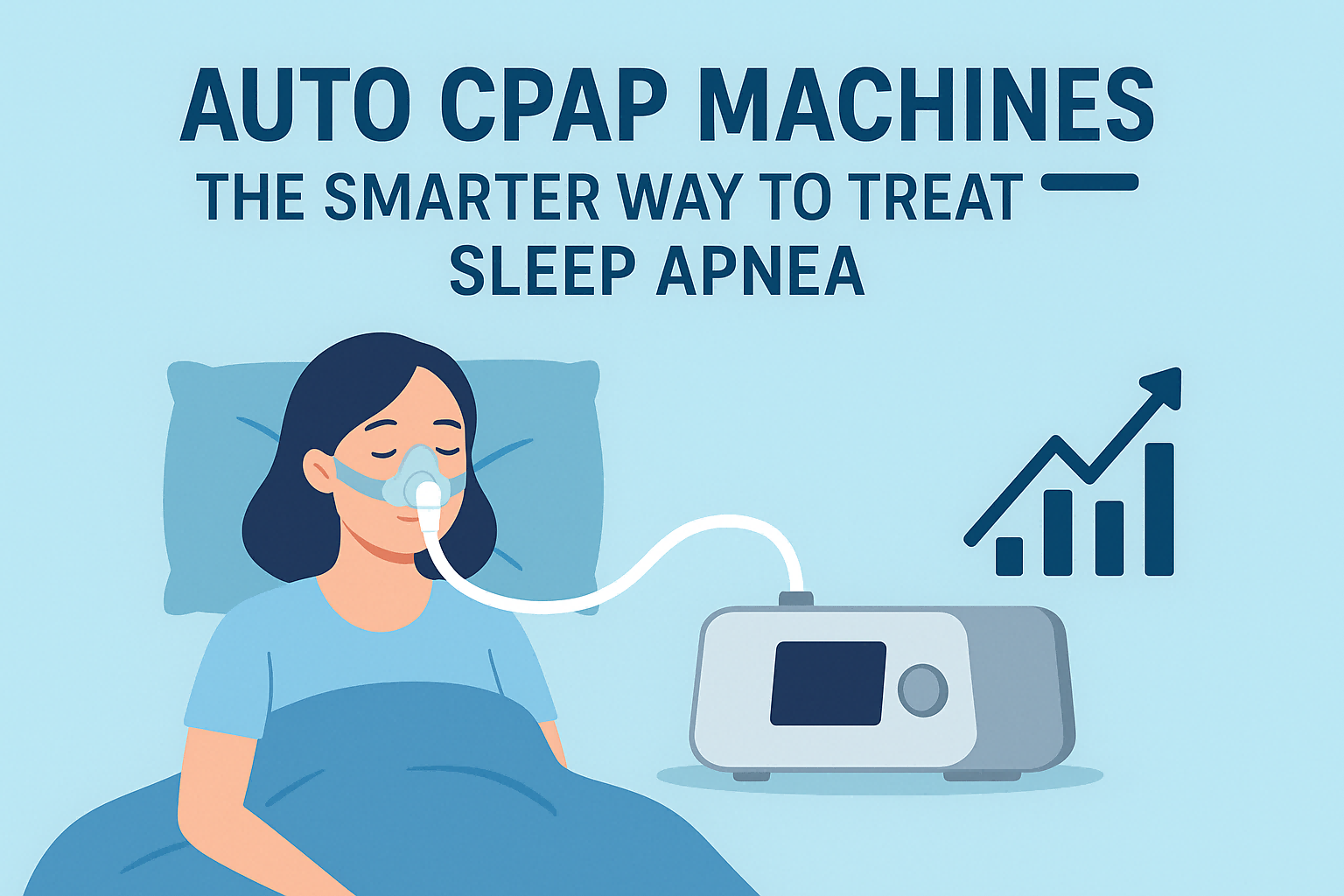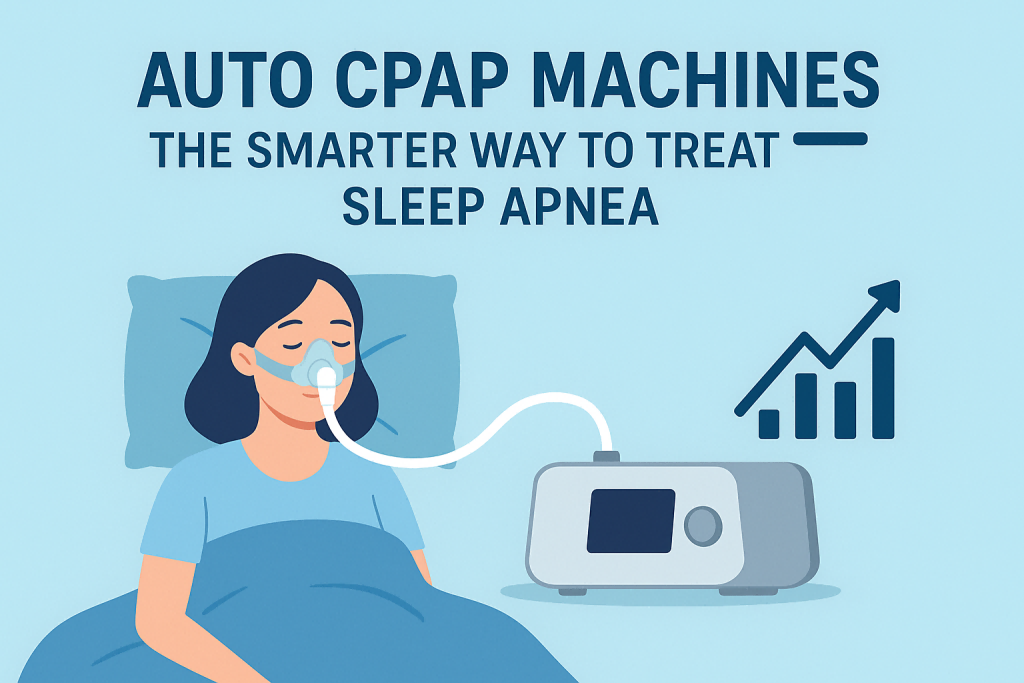Auto CPAP Machines: The Smarter Way to Treat Sleep Apnea


Sleep is the body’s natural reset button, yet millions of people struggle with sleep apnea, a condition that interrupts breathing throughout the night. For years, Continuous Positive Airway Pressure (CPAP) machines have been the gold standard for treatment. But thanks to advancements in medical technology, Auto CPAP machines are now transforming sleep therapy into a smarter, more comfortable experience.
In this article, we’ll explore how Auto CPAP machines work, their advantages, and why they are quickly becoming the preferred solution for patients and sleep specialists alike.
Introduction to Sleep Apnea and Its Health Risks
What is Sleep Apnea?
Sleep apnea is a sleep disorder where breathing repeatedly stops and starts during the night. The most common type, obstructive sleep apnea (OSA), occurs when throat muscles relax and block airflow.
Common Symptoms and Warning Signs
- Loud, chronic snoring
- Sudden awakenings with choking or gasping
- Morning headaches
- Daytime sleepiness and fatigue
- Difficulty concentrating
Health Complications if Left Untreated
Ignoring sleep apnea can lead to serious health risks such as:
- High blood pressure
- Heart disease and stroke
- Type 2 diabetes
- Depression and anxiety
- Increased risk of accidents due to fatigue
Understanding CPAP Therapy
The Role of Continuous Positive Airway Pressure (CPAP)
Traditional CPAP machines deliver a constant stream of pressurized air to keep airways open while you sleep. This prevents pauses in breathing and reduces snoring.
Difference Between Fixed CPAP and Auto CPAP
- Fixed CPAP: Provides one steady pressure throughout the night, prescribed by a sleep specialist.
- Auto CPAP (APAP): Automatically adjusts air pressure based on your breathing patterns, ensuring optimal comfort and efficiency.
What Are Auto CPAP Machines?
How Auto CPAP Works
Auto CPAP devices use advanced algorithms and sensors to detect changes in breathing. If the airway begins to collapse, the machine increases pressure. If breathing is stable, it lowers pressure to a more comfortable level.
Key Features of Auto CPAP Devices
- Automatic pressure adjustment
- Built-in humidifiers
- Ramp settings for easier sleep onset
- Smart connectivity with mobile apps
- Quiet operation
Who Should Use Auto CPAP?
Auto CPAP is ideal for:
- Patients with varying pressure needs throughout the night
- People who find fixed CPAP uncomfortable
- Those newly diagnosed with sleep apnea who don’t yet know their optimal pressure settings
Benefits of Auto CPAP Machines
Personalized Pressure Adjustment
Unlike fixed CPAP, Auto CPAP adapts in real-time to your breathing, ensuring you always receive the right amount of support.
Improved Comfort and Better Sleep Quality
Because pressure only increases when needed, patients often report more natural and restful sleep.
Reduced Side Effects Compared to Fixed CPAP
Less exposure to unnecessary high pressure means fewer issues like dry mouth, bloating, or discomfort.
Higher Therapy Compliance
Since Auto CPAP is more comfortable, patients are more likely to stick with treatment—leading to better long-term health outcomes.
Choosing the Right Auto CPAP Machine
Important Features to Look For
When selecting an Auto CPAP machine, consider the following must-have features:
- Pressure Range Flexibility: Ensures your device adapts to changing breathing needs.
- Heated Humidifier: Reduces dryness and irritation in the airways.
- Ramp Function: Starts at a lower pressure and gradually increases for easier sleep onset.
- Data Tracking: Allows both you and your doctor to monitor therapy progress.
- Noise Level: Look for machines operating at less than 30 decibels for a peaceful night.
Popular Brands and Models
Several trusted brands dominate the Auto CPAP market, including:
- ResMed AirSense 10 & 11 – Known for comfort and connectivity features.
- Philips Respironics DreamStation Auto – Offers advanced data tracking.
- Fisher & Paykel SleepStyle Auto – Compact and user-friendly design.
Each brand has unique strengths, so it’s wise to consult with your sleep specialist before purchasing.
Cost Considerations and Insurance Coverage
Auto CPAP machines generally cost between $500 and $1,200, depending on features. Many insurance providers cover part or all of the cost if a sleep apnea diagnosis is documented. Patients should also factor in recurring expenses like masks, filters, and tubing replacements.
Tips for Successful Auto CPAP Therapy
Proper Mask Fit and Comfort
The mask is often the most challenging part of CPAP therapy. To ensure success:
- Choose from nasal pillows, nasal masks, or full-face masks based on comfort.
- Ensure a snug but not overly tight fit.
- Use mask liners to reduce irritation.
Maintenance and Cleaning
A clean machine ensures effective therapy and prevents infections.
- Wash the mask and tubing weekly with mild soap.
- Replace filters regularly.
- Empty and refill the humidifier daily with distilled water.
Adjusting to Nightly Use
It may take time to get used to Auto CPAP therapy. Try these tips:
- Wear the mask during the day while watching TV to get comfortable.
- Use the ramp function for easier adjustment.
- Stay consistent—most patients adjust within two to four weeks.
Auto CPAP vs. BiPAP: What’s the Difference?
While Auto CPAP and BiPAP both treat sleep apnea, they differ in how pressure is delivered:
- Auto CPAP (APAP): Adjusts pressure automatically but maintains a single-level pressure at any given moment.
- BiPAP (Bilevel Positive Airway Pressure): Provides two pressures—higher during inhalation and lower during exhalation.
BiPAP is often prescribed for patients with more severe sleep apnea or additional conditions like COPD. For most patients, Auto CPAP is sufficient and more cost-effective.
Latest Innovations in Auto CPAP Technology
Smart Connectivity and Mobile Apps
Modern Auto CPAP machines connect to smartphones via Bluetooth or Wi-Fi. Apps allow patients to:
- Track nightly sleep quality
- View pressure adjustments
- Receive coaching tips
Data Tracking and Remote Monitoring
Some devices send data directly to healthcare providers, allowing for real-time adjustments and better long-term management. This is especially useful for patients living in remote areas who may not have easy access to sleep clinics.
Patient Success Stories with Auto CPAP
Many patients who struggled with fixed CPAP therapy found Auto CPAP to be a game-changer. For example:
- Mark, 52: “I finally sleep through the night without waking up gasping. The Auto CPAP adjusts seamlessly.”
- Susan, 38: “I hated my old CPAP machine. The Auto CPAP feels natural—I barely notice it anymore.”
- David, 60: “My doctor can see my progress remotely, which keeps me accountable and motivated.”
These stories highlight how comfort and adaptability improve treatment success rates.
Frequently Asked Questions (FAQs)
1. Can I use Auto CPAP without a sleep study?
While some online retailers sell Auto CPAP devices without prescriptions, a sleep study is essential for proper diagnosis and treatment. It ensures you get the right device and pressure settings.
2. How long does it take to adjust to Auto CPAP?
Most patients adapt within two to four weeks, though comfort improves faster compared to fixed CPAP.
3. Are Auto CPAP machines noisy?
No, most modern Auto CPAP devices are extremely quiet, typically under 30 decibels—about the sound of a whisper.
4. Do Auto CPAP devices require prescriptions?
Yes, in most countries, a prescription from a sleep specialist is required to purchase an Auto CPAP machine.
5. Can Auto CPAP help with mild sleep apnea?
Yes, Auto CPAP can effectively treat mild to severe sleep apnea by adapting to the user’s nightly breathing needs.
6. How often should I replace the mask and filters?
- Mask cushions: Every 1–3 months
- Headgear: Every 6 months
- Filters: Every 2–4 weeks (disposable) or 6 months (washable)
Conclusion: The Smarter Way to Treat Sleep Apnea
Auto CPAP machines represent a significant leap forward in the treatment of sleep apnea. By automatically adjusting air pressure, they provide personalized comfort, better sleep quality, and higher compliance rates compared to traditional CPAP.
If you or a loved one struggles with sleep apnea, consider talking to your doctor about Auto CPAP therapy. With modern technology, treating sleep apnea doesn’t just mean better sleep—it means better health and a better quality of life.
For more insights, you can explore resources from the American Sleep Apnea Association to stay informed about treatment options.
✅ Final Word: Auto CPAP machines truly are the smarter way to treat sleep apnea, combining innovation, comfort, and efficiency for long-term health benefits.
















